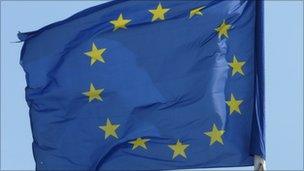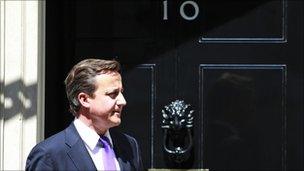Europe’s state of anxiety
- Published
- comments

Will Greece be forced to default on its debt?
Europe's leaders are unsettled, scratchy. Old certainties have given way to anxiety. The open road to ever closer union is now strewn with boulders.
You can gauge the ebbing confidence from remarks that didn't need to be made.
"Europe is still sexy," declared President of the European Council Herman Van Rompuy. "As long as a club attracts new members," he added, "it is in good shape."
More easily you can detect fear in the words of French President Nicolas Sarkozy. Without the euro, he said, there would be no Europe.
Both he and German Chancellor Angela Merkel have said that the fight to save the eurozone is a fight to save the European project.
In their view the threat is existential.
Greece's future
Others looking on have scented the uncertainty. The historian Timothy Garton Ash recently lamented, external that "solidarity and social justice - central values of the post-1945 European project - are in retreat almost everywhere".
Most of the angst is rooted in the eurozone crisis. It has proved far harder to solve than many imagined.
It has opened up tensions between northern and southern Europe. And no-one believes the Greek crisis has been solved. It is still being treated as if Greece needs more cash when the problem is how it reduces its debt.
So further down the road there is the expectation of a crunch.
I am probably overstating the options, but many economists believe they come down to two: either Greece will have to default and/or leave the euro, or the richer European countries will have to absorb Greece's debt.
Thomas Mayer, the chief economist of Deutsche Bank, is one who sees a "significant risk of an eventual break-up of European Monetary Union".
For Europe's elite, the idea of a country leaving the euro is anathema.
The new chief of the International Monetary Fund, Christine Lagarde, said Greece quitting the eurozone "must be imperatively and by all means avoided".

European leaders insist the EU is still in good shape
That will be the instinct of most of Europe's leaders who see the euro as a foundation stone of European integration.
And that will push them towards shouldering Greece's debt.
But that will only really be possible if the eurozone takes a giant leap towards economic union, and that can only be underpinned by a major shift towards political union.
Such a step would fundamentally change the EU and presumably would have to be put to the people of the nation states in referenda.
But it would have wide implications outside of the eurozone. How could you have a political union for some and not others?
'Shaken up'
It would present both a challenge and an opportunity. Two European paths could open up. There could be a centrally directed EU on a glide path to ever-closer union. There could be another EU, pragmatic, regulation-lite, co-operating only where there were clear economic benefits.
The options are unlikely to be as clear-cut as I have set out, but this is a moment, as I said earlier, when old verities are being shaken up.
It will be a moment for big ideas. New visions will be in play.
Already the former French President Valery Giscard d'Estaing is doing some blue-sky thinking.
He is proposing a "Congress of the People" in which European and national parliamentarians would come together to debate the state of the union. He wants such a congress to choose the next leaders of the EU. He envisages those selected as being the new founders of European integration.
Most of these ideas won't fly but his intervention is recognition that this is a time for fresh thinking in Europe.

Some British commentators are asking if the UK might be better off outside the EU
It is a moment of immense opportunity for Britain to shape the European future. But critics say the UK is strangely docile, with a coalition that is risk-averse when it comes to Europe.
Charles Grant from the Centre for European Reform describes the government's policy towards Europe as "doing as little as possible".
He believes British Prime Minister David Cameron is guided by one simple maxim: "Do not awaken the sleeping dogs of Conservative euroscepticism."
He questions whether the British are missing a trick and should be part of the emerging conversation.
All of this matters because there is a stirring of the leaves in the UK. Commentators are beginning to discuss what was once consigned to the fringe of politics; that Britain might be better off outside the EU. Two advisers close to Mr Cameron are said to incline towards that opinion.
Matthew Parris, writing in The Times at the weekend, asked whether it was inevitable that Britain should remain a full member of the EU.
He envisaged two or more different kinds of membership co-existing side by side. One would be forging an ever-closer union; the other more detached.
Simon Jenkins in The Guardian , externalsaid "closer European union... was an attempt by a supranational economic authority to supersede national democracy".
The crisis in Greece is raising some very fundamental questions and not just in the UK.
The current strategy is to muddle through. It might just work. Greece might find growth from somewhere and its debt mountain might subside - but don't bet on it. And the deeper the crisis, the more all kinds of ideas and visions will bubble to the surface. The debate would be on.